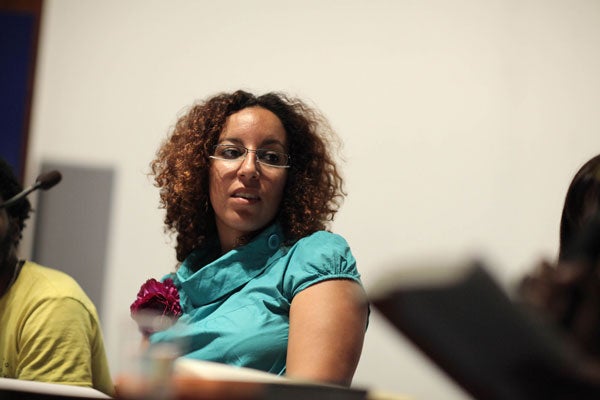The Last Patriarch by Najat El Hachmi, trans Peter Bush

Your support helps us to tell the story
This election is still a dead heat, according to most polls. In a fight with such wafer-thin margins, we need reporters on the ground talking to the people Trump and Harris are courting. Your support allows us to keep sending journalists to the story.
The Independent is trusted by 27 million Americans from across the entire political spectrum every month. Unlike many other quality news outlets, we choose not to lock you out of our reporting and analysis with paywalls. But quality journalism must still be paid for.
Help us keep bring these critical stories to light. Your support makes all the difference.
Chapter 46 of this novel of 77 short chapters ends with the narrator's father, Mimoun, hurling a knife at his daughter and smashing a plate against the wall: "Fragments of glass rained down". Chapter 47 opens "It was fun going all over the place with Father." The juxtaposition catches the book's disconcerting tone. Though family life consists of rape, domestic violence, attempted murder and suicide, drunken abuse, hidden secrets and false accusations, the tone is light and matter-of-fact. Najat El Hachmi has a great eye for the comic in the disasters of everyday life.
The Last Patriarch is the story of a girl from a poor family coming through against the odds to reach university and write the book we've been reading, a "Portrait of the Artist as a Young Woman". It is also a tale of modern emigration, from Morocco to Catalonia, and the conflicts of cultures, identity and feelings involved. The novel caused a sensation in Catalonia, winning the Ramon Llull Prize in 2008: the first major novel written by a Moroccan immigrant in one of the languages of Spain, Catalan in this case.
El Hachmi's novel is divided into two parts. The first tells the story of Mimoun, the last patriarch, from his birth in a Rif village. She documents Mimoun's upbringing, pinpointing detail for the European reader. Physically attractive, Mimoun is allowed to do just what he wants. His outbursts of rage are accepted by the older sisters and mother who cosset him and so he never matures emotionally. While his mother and sisters lead enclosed, obedient lives, he is free to become a tyrant. Mimoun does not see reality clearly: dominated by his desires, he invents ridiculous stories to justify his behaviour and believes his fantasies. El Hachmi draws a distinction: in his violent madness, Mimoun is not typical of Moroccan men; yet it is a madness fostered by the set of beliefs of his family and society.
Mimoun believes his destiny is higher than life in a remote Rif village and emigrates to Girona. El Hachmi excels in her portrayal of this alien place, where people eat so much pork they can hardly walk and the smell of pigs and tanneries hangs over the city. Mimoun feels free to drink and associate with "Christian" women, even when he brings his wife and children to live with him.
The second half is narrated by his daughter, growing up to speak perfect Catalan, studying and entering into conflict with her father, school and beat her if she talks to boys. She loves her father, submits and rebels at the same time: the novel is never simplistic about oppression. She finds her refuge in literature: particularly in Catalonia's great 20th-century novelist, Mercè Rodoreda.
Translated smoothly from the Catalan by Peter Bush, The Last Patriarch works on all its levels: a document of the changes assailing modern Morocco; a story of the suffering and success of migration; and a feminist diatribe on how desire and courage can defeat patriarchal values. Najat El Hachmi's narrative poise, humour and fresh, unrepressed language turn her painful subject-matter into a pleasure to read.
Michael Eaude's 'Catalonia: a cultural history' is published by Signal Books
Join our commenting forum
Join thought-provoking conversations, follow other Independent readers and see their replies
Comments